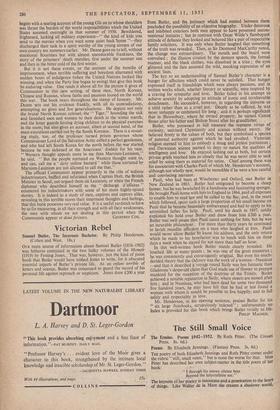Victorian Rebel
Samuel Butler, The Incarnate Bachelor. By Philip Henderson. (Cohen and West. 18s.) OUR main source of information about Samuel Butler (1836-1902) was hitherto contained in the two bulky volumes of the Memoir (1919) by Festing Jones., That was, however, just the kind of pious book.that Butler would have wished Jones to write, for it obscured essential aspects of Butler's private life. As an enfant terrible of letters and science, Butler was concerned to guard the record of his personal life against reproach or suspicion. Jones drew £200 a year from Butler, and the intimacy which had existed between them precluded the possibility of an objective biography. Under decorous and inhibited exteriors both men appear to have possessed uncon- ventional instincts ; but in contrast with Oscar Wilde's flamboyant attitude of defiance they looked and behaved like a pair of respectable family solicitors. It was only when Butler laughed that something of the truth was revealed. Then, as Sir Desmond MacCarthy noted, the change was extraordinary. The mouth and the beard were convulsed ; the illusion created by the demure speech, the formal manner, and the black clothes, was dissolved in a trice ; the eyes glittered and the face assumed the wild, mocking expression of an ancient faun.
The key to an understanding of Samuel Butler's character is a hunger for affection which could never be satisfied. That hunger expressed itself in friendships which were always passions, and in written works which, whether literary or scientific, were inspired by a craving for sympathy and love. Butler failed in his attempt to achieve serenity by adopting an attitude of ironic and invulnerable detachment. He succeeded, however, in regarding the universe as a mild rather than as a cruel jest. Deeply as he -suffered, he was riever unhappy or embittered for long ; and it is perhaps significant that in Shrewsbury, where he owned property, he named Canon Street after his father •and Bishop Street after his grandfather..: . Butler, who pOssessed in • full measure the supreme virtue of curiosity, satirised Christianity and science without mercy. He believed firmly in the values of both, but they symbolised a species of paternal authority against which he had revolted. Victorian religion deemed 'to him to embody a smug and joyless puritanism ; and. Darwinian• science seemed to deny to nature the qualities of intelligence and love: He enjoyed lashing out at both, but certain private griefs touched him so closely that he was never able to seek relief by using them as material for satire. Chief among these was his association with Charles Pauli of which Mr. Henderson's account, although not wholly new, would be incredible if he were a less careful and convincing narrator.
Pauli, who had been at Winchester and Oxford, met Butler in New Zealand in 1863. Butler had emigrated to become a sheep farmer, but he was bewitched by a handsome and fascinating sponger. He brought Pauli home with him to England in 1864, paid all expenses to enable him to read law and be called to the Bar, and, in the years which followed, spent such a large proportion of his small income on Pauli that he became financially embarrassed and had to apply to his astonished father for help. Pauli, until his death in 1897, coldly exploited his hold over Butler and drew from him £200 a year. Butler was well aware that Pauli cared nothing for him, but he was an incurable philanderer. For more than thirty years he continued to lavish maudlin affection on a man who laughed at him. Pauli would never allow Butler Yo know his address, and the only return which he made to his benefactor was to lunch with him on three days a week when he stayed for not more than half an hour. In this well-written book Butler stands clearly revealed. He touched life at many points ; he was one of the great eccentrics ; he was consistently and extravagantly original. But even his much- derided theory that the Odyssey was the work of a woman—Nausicaa —and that it described a voyage round Sicily was less fantastic than Gladstone's desperate claim that God made use of Homer to prepare mankind for the reception of the doctrine of the Trinity. Butler achieved a notable reputation in.Sicily, where streets are named after him ; and in Nausicaa, who had been dead for some two thousand five hundred years, he may have felt that he had at last found a woman with whom it would be possible to live happily, and to fall safely and respectably in love. Mr. Henderson, in his opening sentence, praises Butler for his " six large Notebooks, scrupulously indexed" ; unfortunately no Index is provided for this book which brings Butler vividly to life. PHILIP MAGNUS.


































 Previous page
Previous page